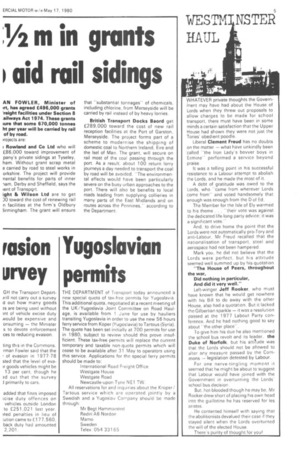WESTM NSTEI HAUL
Page 7

If you've noticed an error in this article please click here to report it so we can fix it.
WHATEVER private thoughts the Government may have had about the House of Lords when they threw out proposals to allow charges to be made for school transport, there must have been in some minds a certain satisfaction that the Upper House had shown they were not just the Tories' obedient poodle.
Liberal Clement Freud has no doubts on the matter — what have unkindly been called ''the Iron Lady's bovver boys in Ermine" performed a service beyond praise.
It was a telling point in his successful resistance to a Labour attempt to abolish the Lords, and he made the most of it.
A debt of gratitude was owed to the Lords, who "came from wherever Lords come fromand voted handsomely that enough was enough from the D of Ed.
The Member for the Isle of Ely warmed to his theme . "their vote was against the dedicated life-long party advice; it was a significant vote."
And, to drive home the point that the Lords were not automatically pro-Tory and anti-Labour, Mr Freud recalled that the nationalisation of transport, steel and aerospace had not been hampered.
Mark you, he did not believe that the Lords were perfect, but his attitude seemed well summed up by his quotation The House of Peers, throughout the war, Did nothing in particular, And did it very well."
Left-winger Jeff Rooker, who must have known that he would get nowhere
with his Bill to do away with the other House, also had a quotation. But it lacked the Gilbertian sparkle — it was a resolution passed at the 1977 Labout Party conference. And he had nothing good to say about 'the other place''.
To give him his due he also mentioned the school bus revolt and its leader, the Duke of Norfolk, but his attitude was that the Lords should not be allowed to alter any measure passed by the Commons — legislation detested by Labour.
For one nerve-tingling moment it seemed that he might be about to suggest that Labour would have joined with the Government in overturning the Lords' school bus decision.
But, hot-blooded though he may be, Mr Rooker drew short of placing his own head into the guillotine he has reserved for les aristos.
He contented himself with saying that the abolitionists devalued their case if they stayed silent when the Lords overturned the will of the elected House.
There's purity of thought for you!








































































































